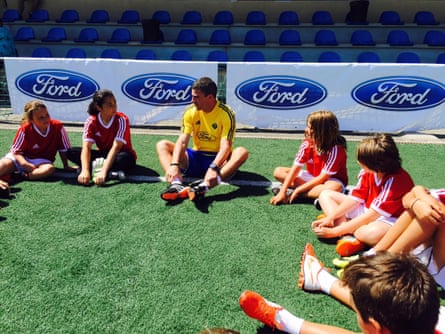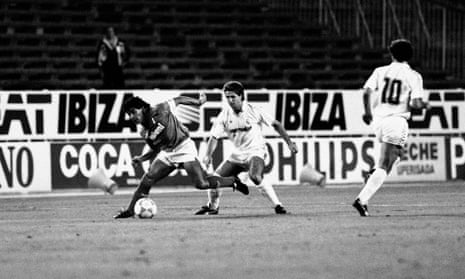The teams are in and Diego Maradona will be leading Napoli in Madrid. He touched down at Barajas airport on Monday and took refuge in his hotel – the same hotel Real Madrid use when they are brought together the night before home games – from where he will head to the Santiago Bernabéu on Wednesday night, invited by the Napoli president Aurelio de Laurentiis. Thousands of Neapolitans will be there too, high in the north stand. The ones who get tickets, anyway. The sports newspaper AS said on its front-page: “10,000, plus Maradona”. Marca warned on its cover: “Don’t get overconfident, even Maradona’s coming”.
He has been here with Napoli just once before. They might not get much of a glimpse of him; but not many saw him back then, either. It is 30 years ago now. September 1987: Napoli against Real Madrid in the European Cup first round, a game played behind closed doors with barely 200 people in the stadium after a ban was imposed because of trouble the previous season. If it feels like Maradona dominates the build-up to this game, he dominated the build-up to that game more. It is just that as it turned out, the game itself was a different matter.
“I don’t know if people are really aware of who Diego Maradona was, what he was,” says Manolo Sanchís, the central defender who played that night and was for several years Real Madrid’s appearance record-holder. “Maradona was the supreme being made footballer.”
As for Madrid, they were a moment, the sporting incarnation of a society marked by generational change and expression; a kind of footballing version of the Movida Madrileña, a movement that expressed liberation, imagination and enjoyment, in music, film and art. They called them the Quinta del Buitre, named after five local players who came through the youth system – Sanchís, Míchel González, Miguel Pardeza, Rafael Martín Vázquez, and Emilio Butragueño, the “Buitre” or “Vulture” – and team‑mate Jorge Valdano went so far as to call them “the sporting arm of the transition to democracy; as the Movida existed, the Quinta existed”. Míchel said: “Looking back on it, that generational change is very real. One of the things we did was turn identities on their head; we were part of society changing.”
Sanchís admits that they did not realise at the time just how big their impact and symbolism would be, how they would come to define an era and be defined by an era, but they knew that theirs was a special team, different. “We came from a spectacular [Real Madrid B team] Castilla side, brought through by Alfredo Di Stefano, all of us growing up together, we were all from Madrid, and that was very important: there was a real identification with us and we had a way of understanding football that was closely linked to society [at the time],” he says.
When they met Napoli in 1987, the Quinta had won two league titles in a row – the start of a run that would carry them all the way to 1990 – and two Uefa Cups, on course to be arguably the most successful side Madrid have had, domestically at least. But it was not just what they won, it was how they won it.

“We had won the Uefa Cup twice, which was very difficult then, and there was a great need to win the European Cup,” Sanchís says. “Madrid hadn’t won it since 1966 and had lost the 1981 final against Liverpool. We had been searching for it for years and wanted to create that special communion. We had very, very good players, we were favourites and as a team we were still the reference in Europe. As a player, he was: it was set up almost as a Madrid versus Maradona.”
After all Maradona was, well, Maradona. “Maradona has never been and never will be just another player,” Sanchís says. “If his personal life had not been so damaging, if he had been luckier – there has never been a bigger expression of football in a single player as there was at the 1986 World Cup. Other players, now for example, have been more consistent, but no one reached the level of excellence in that short spell of time that he did in Mexico. And at Napoli, he had taken them to the league.
“It was a great Real Madrid versus Maradona. The thing was, Chendo made it so that no one realised we were even playing him. He got the better of him.”
Miguel Porlán, “Chendo”, will be on the bench at the Bernabéu on Wednesday night: he is Madrid’s team delegate. That night, he was their right-back. At one point, he even nutmegged Maradona. Valdano famously likened that moment to “the birds shooting at the rifles”. The word Sanchís uses to describe his reaction and that of his team-mates is “ojiplático”: it translates, poorly, as something like “plate‑eyed”. Eyes as wide as plates.
“You go out for the match and there’s no one there, just a few voices from the people with contacts, but once the game starts it’s just the game, like any other. Maybe Madrid players, because of the Bernabéu, know how to isolate themselves from what’s going on around them, but it’s [also] because the level of concentration is so high,” he says.
Especially for Chendo. “When he nutmegged Maradona, we were ojipláticos. ‘Madre mía!’. No one expected that. Afterwards there were lots of jokes in the dressing room. That nutmeg is what people always remember, but it was the whole game: Diego could never get away from him.”
The former Napoli president suggested that Maradona was not fully fit that night; between that and Chendo, his impact was limited. Madrid won the first leg 2-0, drawing 1-1 away, and went through. It was a victory that felt special, like it was paving the way for something huge, but things were not about to get much easier. “Napoli, Porto, Bayern, PSV – that tells you what the European Cup was like then,” Sanchís says. It started with Napoli – always “El Napoli de Maradona” – but it ended with defeat on away goals against PSV in the semi-final. In 1987-88 the Quinta played their best football, finishing 11 points clear of Real Sociedad in the league. It was also their great opportunity; the Milan side who would twice defeat them in the semi-final had not yet emerged. But it was not to be and that hit them hard.
“When I joined Real Madrid, the desire to win the European Cup was palpable,” Butragueño recalled. “The last time had been 1966; we’re talking about 1988, 22 years later. We beat Napoli, with Maradona; Porto, who were the champions; Bayern Munich, finalists the previous season. And then in the semi-final we were favourites.
“That was our season. When you’re a player sometimes you know it’s your moment – and that was our moment. We were an extraordinary team. It was a great side. It was our time.” In the semi‑final, though, Hans van Breukelen saved everything. “That year we failed to score in just two games out of 60-odd and one of them was there,” Butragueño said. “That night in Eindhoven was just terrible, without doubt the worst night in my career. It was devastating.”
The Quinta del Buitre won five league titles in a row and are often regarded as the best, most creative team Madrid have had, but they never won the European Cup, the trophy that defines the club. It is as if something is missing; they did not quite take that step that Madrid are obliged to take.
“I’d turn that round,” Sanchís says. “How great must that team have been if, without winning the European Cup, it is still remembered as one of the three great generations in the club’s history, with Di Stefano’s team which won five in a row and the Ye-Yes [who won the 1966 title]? Every year, Madrid have good teams. But our team was so, so outstanding that even without that trophy, we have that consideration.” More so, in fact, than the team that did finally end the wait – for him, as well as the club.
Pardeza, whose Madrid career was brief and had gone by the time Maradona and Napoli came, has just released a novel and has been sporting director at the Bernabéu. Manolo Sanchís and Rafael Martín Vázquez are both commentators, and together run CD Ford, a football club for children in Madrid. Míchel became a coach. Butragueño is director of institutional relations for Madrid. Together, they were the team. But of them, only Sanchís won the European Cup: he was still there in 1998 when Madrid beat Juventus in Amsterdam.
His father, Manuel Sanchís, a European Cup winner with Madrid, was there, too. “There are only three cases of fathers and sons winning the European Cup: the Maldinis, the Busquets family, and us,” Sanchís says. “And in a way, I was almost jealous of my father that day. He had won it in 1966 and 32 years later he was there watching me; when you see your son do the same I think the sense of pride, the intensity of the feeling, is even greater than winning it yourself.”
Yet at the final whistle, Sanchís Jr’s initial thoughts were with those who had defeated Maradona with him. He wanted to share this with them, a decade on. “The first thing I did after Amsterdam was talk to them,” he says. “I don’t know if that really compensated for it, but it was unfair that they never won the European Cup.”

Comments (…)
Sign in or create your Guardian account to join the discussion